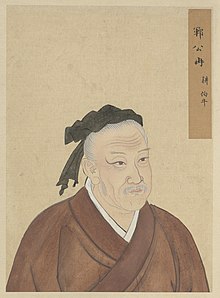Ran Geng
| Ran Geng | |||||||||
|---|---|---|---|---|---|---|---|---|---|
 Ran Geng in Half-Portraits of the Great Sage and Virtuous Men of Old (至聖先賢半身像), housed in the National Palace Museum | |||||||||
| Chinese | 冉耕 | ||||||||
| |||||||||
| Other names | |||||||||
|---|---|---|---|---|---|---|---|---|---|
| Boniu (Courtesy name) | |||||||||
| Chinese | 伯牛 | ||||||||
| Literal meaning | Uncle Ox | ||||||||
| |||||||||
Ran Geng (born 544 BC), also known by his courtesy name Boniu, was one of the most prominent disciples of Confucius. Confucius considered him his third best disciple, after Yan Hui and Min Sun, in terms of moral conduct.[1]
Life
Ran Geng was a native of the State of Lu, and was only seven years younger than Confucius. He was from the same clan as Ran Yong and Ran Qiu, two other prominent disciples of Confucius.[2] When Confucius served as the Minister of Justice of Lu, Ran became the magistrate of Zhongdu.[1] He contracted a vile disease, possibly leprosy,[3] and died young. Confucius lamented his early death with great pain.[1]
Legacy
In Confucian temples, Ran Geng's spirit tablet is placed the fourth among the Twelve Wise Ones, on the west.[2]
Ran Geng's offspring held the title of Wujing Boshi (五經博士; Wǔjīng Bóshì).[4]
References
Citations
- ^ a b c Confucius 1997, pp. 201–2.
- ^ a b Legge 2009, p. 114.
- ^ Han 2010, p. 4571.
- ^ H.S. Brunnert; V.V. Hagelstrom (15 April 2013). Present Day Political Organization of China. Routledge. pp. 494–. ISBN 978-1-135-79795-9.
Bibliography
- Confucius (1997). The Analects of Confucius. Oxford University Press. ISBN 978-0-19-506157-4.
- Han, Zhaoqi (2010). "Biographies of Disciples of Confucius". Shiji (史记) (in Chinese). Beijing: Zhonghua Book Company. ISBN 978-7-101-07272-3.
- Legge, James (2009). The Confucian Analects, the Great Learning & the Doctrine of the Mean. Cosimo. ISBN 978-1-60520-644-8.
